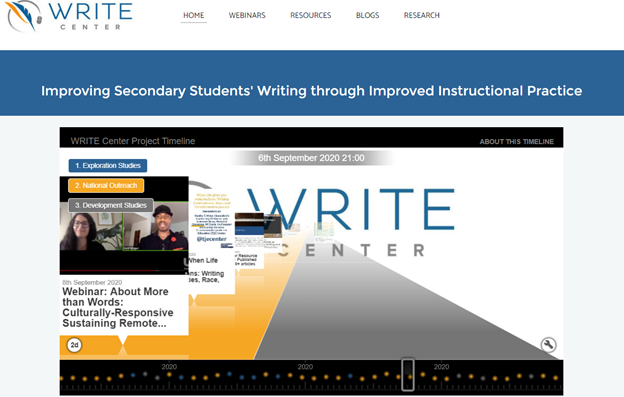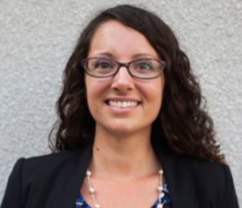Centering Equity through Responsive, Transformative, Healing Literacy Instruction
by Jenell Krishnan
October 30, 2020

During September 2020, the National WRITE Center (Writing Research to Improve Teaching and Evaluation) hosted a webinar series that centered equity through responsive, transformative healing literacy instruction. Our goal was to create spaces for educators, teacher leaders, and researchers to connect and learn with nationally-recognized experts. In what follows, we provide an overview of the series, how to gain access to webinar materials, and information on upcoming events.
On September 14th, the series began with “About More than Words: Culturally Responsive-Sustaining Remote Writing Instruction,” facilitated by Dr. David Kirkland, the Vice Dean of Equity, Belonging, and Community Action at New York University. Dr. Kirkland engaged participants in a conversation on what it means to teach writing in the time of global pandemic, social unrest, and economic uncertainty. He offered guidelines to promote culturally responsive-sustaining teaching practices in technology-enhanced settings and supported a crucial conversation about how we can best serve our diverse populations during and beyond the COVID crisis. When asked “What do you intend to put into action from this webinar?, participants shared:
- “I loved the idea of doing empathy conferences, making my students my partners in learning, and having them help me craft community values.”
- “I want to spend more time working with students in developing their writing voice by providing them the opportunities to explore their stories.”
The series continued on September 21st with “When Life Gives You Watermelons: Writing Communities, Race, and Transformative Justice,” facilitated by Dr. Maisha T. Winn, the Co-Director of Transformative Justice in Education Center and Associate Dean at the University of California, Davis. Dr. Winn introduced the Transformative Justice English/Language Arts design principles and demonstrated how the 5 pedagogical stances—History Matters, Race Matters, Justice Matters, Language Matters, and Futures Matter—can serve as tools for paradigm shifting toward justice in learning communities. Participants shared the following:
- “I intend to use transformative justice circles and inquiry questions to help my students explore their personal history/future and the country’s history/future.”
- “I left with an article and activity to use to engage students in discussions, writing, and thinking about diversity and transformative justice.”
On September 28th, the series concluded with “Words as Balm: Civic Writing and Healing In Precarious Times,” facilitated by Dr. Antero Garcia, assistant professor at Stanford University. In this session, Dr. Garcia guided participants through ways to center youth civic voice in classrooms and explored how such writing can help address the complex emotions of teachers and students today. Participants shared:
- “He completely had me at the first question: “What is your balm?” I’ve never thought to ask how my students and colleagues are feeling by using that word, but I find it incredibly powerful.”
- “I love the idea of presenting kids with a civic writing space and creating a way for them to share their ideas in a way that promotes civic duty!”
Learn more about these webinars and available materials by completing this brief form.
Register here for “Cultivating Genius and Joy: An Equity Model for Culturally and Historically Responsive Literacy,” a free webinar facilitated by Dr. Gholdy Muhammad on March 17th, 2021.

Jenell Krishnan, PhD is the Project Scientist for the National WRITE Center at the UCI School of Education and a former ELA teacher from Western New York.
